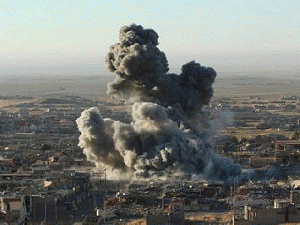Reprinted from journal-neo.org by Tony Cartalucci
In the wake of the Paris attacks, the West has sought to leverage what it had hoped would be a renewed public will for expanded war abroad. To this end, the US and Turkey have announced an operation which it claims will secure the last 98 kilometers of the Turkish-Syrian border -- an area roughly between the west bank of the Euphrates river near Jarabulus, to Afrin and Ad Dana further West.
Repackaging NATO's 2012 "Safe Zone"
Those familiar with the Syrian conflict would recognize this section of the Syrian-Turkish border as precisely the boundaries of the long-sought after "safe zone" the US, NATO, and the Gulf Cooperation Council (GCC) have attempted to establish since as early as 2012. The Paris attacks and several minor border incidents recently reported, seem to be only the latest in a long line of cited provocations this axis has attempted to use to implement its preconceived plans.
This region between Jarabulus and Afrin constitutes the primary corridor through which the summation of Al Qaeda's Al Nusra Front and the so-called "Islamic State" or ISIS, receive weapons, supplies, and fresh fighters. Through coordinated efforts between Syria's Kurds and the Syrian government itself, the rest of Syria's northern border with Turkey has been sealed. As this process has progressed, the desperation of the Western-led axis seeking regime change in Damascus has increased proportionally.
Endgame Approaches
In reality, regardless of the West's repetitive platitudes regarding its determination to "fight ISIS," its actions and the actions of its regional allies have fully illustrated a desire to preserve the terrorist group. Its feigned "war on ISIS" helped open the door to the recent Russian military intervention. With Russia's entry into the war, the West can no longer afford to drag out its nonexistent operations against ISIS, hoping for an opportunity to finally divide and destroy the country.
Russia and the Syrian Arab Army for whom it is providing air support, have nearly closed the Jarabulus-Afrin corridor themselves. In fact, the week before the Paris attacks, Syrian troops had established a corridor to the besieged Kweires airbase, just 40 kilometers from the Euphrates. Since then, the Syrian military has expanded its control around the surrounding area. Should it reach the Euphrates, along with taking Aleppo and moving northeast from Latakia in the west, Syria will fill the void NATO has long sought to establish its "safe zone" in.
In other words, there is a race between NATO to implement a partial occupation of Syria, and Syria and its allies racing to fill the void before this happens -- and the race is nearly over.
The Unasked Question
The Paris attacks were carried out with serendipitous timing -- on the very eve of the Vienna talks, and just as Syria and its allies approached the boundaries of NATO's desperately desired "safe zone." The attacks gave the West a strong hand going into the Vienna talks and will undoubtedly help justify expanding US-Turkish operations in northern Syria.
And while suggestions that the West had any connection to the Paris attacks may be brushed off as a "conspiracy theory" despite emerging evidence revealing just how much French and other Western security and law enforcement agencies knew about the attackers before they struck, the fact that the US and Turkey are seeking to secure Turkey's border with Syria from the Syrian side instead of within NATO territory itself, reveals the true nature of this unfolding conflict.
In Reuters' report, "U.S., Turkey working to finish shutting northern Syria border: Kerry," it claims:
U.S. Secretary of State John Kerry said on Tuesday the United States is starting an operation with Turkey to finish securing the northern Syrian border, an area that Islamic State militants have used as a lucrative smuggling route.
Reuters also claims (emphasis added):
The area where the operations would take place is now controlled by the radical Islamists. The United States and Turkey hope that by sweeping Islamic State, also frequently called Daesh, from that border zone they can deprive it of a smuggling route which has seen its ranks swell with foreign fighters and its coffers boosted by illicit trade.
(Note: You can view every article as one long page if you sign up as an Advocate Member, or higher).







